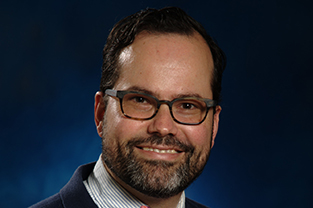August 19, 2019
SVSU professor’s examination of lie detector test’s history published by Smithsonian Institution
 A Saginaw Valley State University educator’s historical examination of polygraph tests recently was published on the online magazine for the Smithsonian Institution.
A Saginaw Valley State University educator’s historical examination of polygraph tests recently was published on the online magazine for the Smithsonian Institution.
John Baesler, SVSU professor of history, wrote the paper entitled “Why Lie Detector Tests Can’t Be Trusted,” which explores how federal agencies since the 1950s have utilized the technology to reassure the public it could unmask spies.
The article was not Baesler’s first deep dive into the topic. He authored the book, “Clearer Than Truth: The Polygraph and the American Cold War,” released in 2018 by University of Massachusetts Press.
His recently-published essay — which he wrote originally for the website Zocalo Public Square before it was picked up by the Washington, D.C.-based Smithsonian Institution’s online magazine — examines the history of polygraphs primarily through the lens of Francis Gary Powers. The American U-2 spy plane pilot was shot down over the USSR and captured by Soviet forces in May 1960. This story was dramatized in the 2015 film, "Bridge of Spies," directed by Steven Spielberg and starring Tom Hanks.
After being exchanged for an imprisoned Soviet KGB colonel and returned to the U.S., Powers faced criticism and suspicion for his role in the plane crash, Baesler wrote. Powers was compelled to take a polygraph test as part of his Congressional testimony on the matter, as the tests were considered an important investigative tool at the time.
Polygraph tests work by measuring changes in blood pressure, breathing depth and how well the skin conducts electricity. Baesler writes that the method has been controversial since it was developed by psychologists in the early 1900s, as it is possible to be trained to beat the test and false positives are common.
“Bureaucratic usefulness, rather than any scientific validity, goes a long way toward explaining why the polygraph became a standard instrument of the American national security state,” Baesler wrote.
Baesler concludes his essay by writing about the dubious nature of using polygraph results in court, the coercive ways it was used and by noting that no major communist spy was ever caught by polygraph during the Cold War.
To read the article in full, go to www.smithsonianmag.com/innovation/why-lie-detector-tests-cant-be-trusted-180972724/
A native of Germany, Baesler earned his undergraduate degree in history and philosophy from Ruprecht-Karls-Universität Heidelberg in 2001 and earned his Ph.D. in U.S. history and cultural history at Indiana University-Bloomington in 2009.
